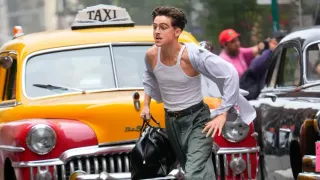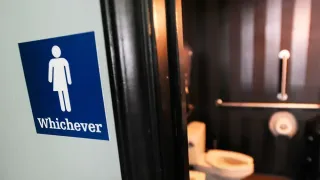May 22, 2022
Kardashians Take Portofino for Kourtney-Travis Wedding
Leanne Italie READ TIME: 2 MIN.
The Kravis wedding train has rolled into Italy.
After a Las Vegas practice wedding (no marriage license) with an Elvis impersonator officiating, followed by a small ceremony (with license) in Santa Barbara, California, Kourtney Kardashian and Travis Barker stepped out Friday in the jet set playground of Portofino, a fishing village known for its multicolored houses and crystalline green water on the Italian Riviera coast.
Photographers snapped the couple, along with the rest of the Kardashian-Jenner clan, as they arrived for dinner clad in Dolce & Gabbana. Notably absent was Scott Disick, the father of Kourtney's three children. They took to the streets again Saturday on their way to lunch, Kourtney in a veil and short black dress emblazoned with a likeness of the Virgin Mary.
The wedding was to be held at some point over the weekend at the rented Castello Brown, a castle built in the Middle Ages overlooking the Gulf of Portofino, according to TMZ.
The reality star, 43, and the Blink-182 drummer, 46, are known for their PDA and didn't disappoint in Portofino, where they were seen Friday on a boat sharing a kiss in the abundant sun – she in a T-shirt of her beau's band and he in his favorite style condition: shirtless with his multiple tattoos on display.
On their way to dinner, "momager" Kris Jenner was in a black dress on the arm of Guilherme Siqueira, a brand ambassador for Dolce & Gabbana. With sis Kim's eldest child, North West, and her own daughter, Penelope Disick, at her sides, Kourtney wore a sheer corseted red gown and matching furry stole. Barker? Shirtless under a black suit as he walked with daughter Alabama.
The third wedding round was to include family and a small circle of close friends, with a larger reception planned later in Los Angeles, according to reports.
Barker and the oldest Kardashian sister went Instagram official with their relationship early last year. He popped the question in October, beachside with a ring of red roses and white candles at a Montecito, California, hotel. Last month, just hours after the Grammys, word of a Las Vegas wedding spread quickly, though no marriage license could be found. Kourtney later clarified they couldn't get one in the wee hours but went ahead with a drunken practice run.
In Santa Barbara, they posted photos after making it legal at the courthouse May 15, the bride in a short white dress with veil and the groom in black, his coat buttoned up for a change. Travis' father, Randy Barker, and Kourtney's grandmother, Mary Jo "MJ" Campbell, were in attendance.
Kourtney didn't marry Disick. Barker has been married twice. His first marriage, to Melissa Kennedy, lasted nine months. His last divorce, from Shanna Moakler, came in 2008. They wed in 2004 and share two teen kids, Alabama and son Landon. Barker is also close with his 23-year-old stepdaughter, Atiana De La Hoya, from Moakler's previous relationship with former boxer Oscar De La Hoya.
The Kardashians ended their long-running "Keeping Up with the Kardashians" on E! last year and decamped to Hulu for a new iteration, "The Kardashians," which debuted in April.
___
Find Leanne Italie on Twitter at http://twitter.com/litalie






